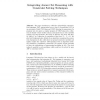Free Online Productivity Tools
i2Speak
i2Symbol
i2OCR
iTex2Img
iWeb2Print
iWeb2Shot
i2Type
iPdf2Split
iPdf2Merge
i2Bopomofo
i2Arabic
i2Style
i2Image
i2PDF
iLatex2Rtf
Sci2ools
116
click to vote
FLOPS
2008
Springer
2008
Springer
Integrating Answer Set Reasoning with Constraint Solving Techniques
Abstract. The paper introduces a collection of knowledge representation languages, V(C), parametrised over a class C of constraints. V(C) is an extension of both CR-Prolog and CASP allowing the separation of a program into two parts: a regular program of CR-Prolog and a collection of denials1 whose bodies contain constraints from C with variables ranging over large domains. We study an instance AC0 from this family where C is a collection of constraints of the form X - Y > K. We give brief implementation details of an algorithm computing the answer sets of programs of AC0 which does not ground constraint variables and tightly couples the "classical" ASP algorithm with an algorithm checking consistency of difference constraints. We present several examples to show the methodology of representing knowledge in AC0. The work makes it possible to solve problems which could not be solved by pure ASP or constraint solvers.
Algorithm Checking Consistency | Automated Reasoning | Bodies Contain Constraints | FLOPS 2008 | Knowledge Representation Languages |
Related Content
| Added | 26 Oct 2010 |
| Updated | 26 Oct 2010 |
| Type | Conference |
| Year | 2008 |
| Where | FLOPS |
| Authors | Veena S. Mellarkod, Michael Gelfond |
Comments (0)

